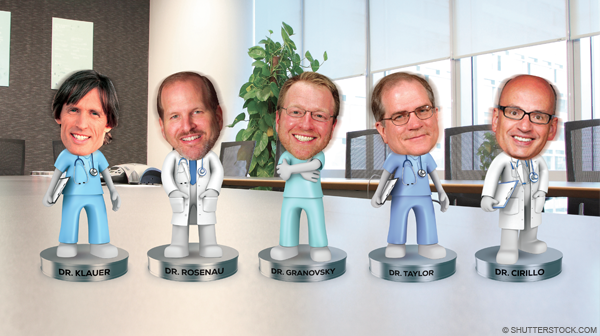
Dr. Taylor: The reason the plans were canceled is the insurance companies chose to not grandfather the plans. It’s not because it wasn’t allowed. So it’s a total—I’m not sure what to call it. It’s just another example of stretching the truth. The reason the insurance companies canceled the plans is because they canceled the ones they weren’t making money on. It was an excuse to get rid of the dogs, and they’re keeping the other ones. So they’re not going to come back. That horse is already out of the barn.
Explore This Issue
ACEP Now: Vol 33 – No 01 – January 2014Dr. Klauer: So the Affordable Care Act gave them the window to do this, and the federal government didn’t foresee that there was economic incentive to have this happen. They should have closed this loophole.
Dr. Taylor: Exactly.
[/fullbar]
Dr. Klauer: So this is for all of you: we’ve got a system in place, so we do have some form of access to health insurance but not necessarily health care. So is this really just an illusion of coverage to the average citizen, or is there true coverage? In other words, with such high deductibles, are we effectively just adding to the ranks of self-pay patients?
Dr. Rosenau: I don’t think it’s fair to say it’s just an illusion of coverage, but it’s like everything else: the devil’s in the details. So the jury is out. In order to get to the point where the Affordable Care Act works well for everyone, it’s going to be a long process that requires a lot of education, and the resources will have to be put there. We also have to be very careful not to create this self-rationing or effective lack of insurance due to very high barriers of deductibles.
Dr. Granovsky: I want to tie back to the very last thing that Kevin said, which is people who are self-pay. Many of the people who are currently self-pay will move into Medicaid products if that state has opted to expand Medicaid. And then the discussion that we’re having is very different. Some states do have a shared portal for their Medicaid products and their health insurance exchange commercial plans. But for most states, the Medicaid enrollment process and the Medicaid benefits are very different than the health insurance exchange process. There’s very little in the way of co-pays, coinsurance, and patient responsibility if you make less than 138 percent of the federal poverty limit and your state has opted to expand Medicaid.




2 Responses to “What Will Obamacare Mean for Emergency Physicians?”
January 12, 2014
jpedmdRe. Dr. Klauer’s comment “So when it comes down to it, this is a shell game. You’re still paying $11,000 before anybody pays one penny of coverage for your family.”
This is just wrong, especially for the example cited – a family of 4, presumably with 2 children and 2 adults. Remember there is substantive free preventative care mandated under the ACA that is often the predominant type of care needed for young healthy families. See:
https://www.healthcare.gov/what-are-my-preventive-care-benefits/
May 27, 2015
Pennsylvania Governor Acts to Ensure Federal Health Care Subsidies - ACEP Now[…] Pennsylvania Governor Tom Wolf said on Friday the state will set up its own health care exchange if needed to save insurance subsidies for thousands of residents under the federal government’s 2010 Affordable Care Act. […]